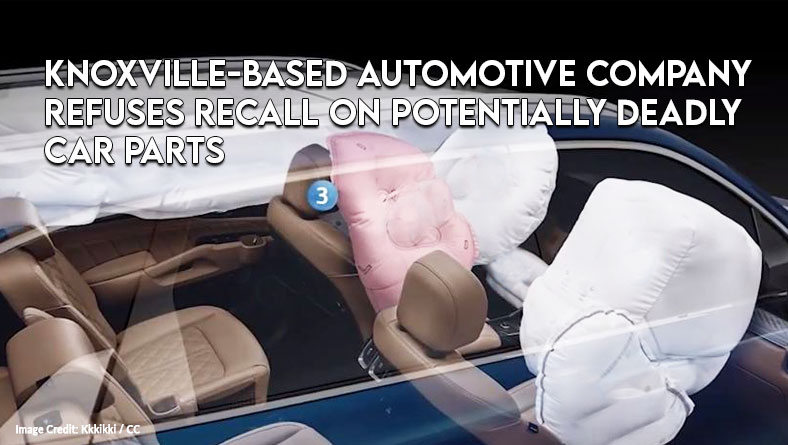Image: Hyundai Center Side Airbag Image Credit: Kkkikki / CC
The Tennessee Conservative Staff –
Vehicle owners across the country are waiting to find out if the airbags in their cars are safe, and a Tennessee-based company is the reason for that.
ARC Automotive, a vehicle company out of Knoxville, is refusing to fulfill a federal request to recall 52 million airbags that could potentially explode, hurling shrapnel that could lead to serious injury or even death.

According to the National Highway Traffic and Safety Administration (NHTSA), the inflators could be found in the following automotive brands:
- Chevrolet
- Buick
- GMC
- Ford
- Toyota
- Volkswagen
- Audi
- BMW
- Porsche
- Kia
- Hyundai
Those vehicles could have driver or front passenger airbag inflators made by ARC, but it is uncertain at the time just how many are affected.
On Tuesday, NHTSA said that the inflators made by ARC are defective, but ARC refused to issue a full recall. Their refusal to take responsibility could land them in a court battle over the potentially defective parts.

The company continues to claim that there are no safety issues with their products, and they assert that NHTSA is basing their claims on a hypothesis rather than data-based conclusions. They also state that NHTSA does not have the authority to force a manufacturer to initiate a recall.
While a full list of vehicle models with the allegedly faulty airbag inflators has not been released, it is estimated that at least 25 million vehicles in the United States contain them.
Seven smaller-scale recalls of inflators have been conducted by car manufacturers since 2017, but all of those were blamed on isolated manufacturing issues.
ARC said that during the eight-year investigation by NHTSA, the government was informed of any unexplained ruptures on the roads and that no common defect has been found and no cause of the inflator ruptures has been identified.

Following the NHTSA’s decision, two automobile companies sent a statement to NewsChannel 9.
Hyundai said, “Hyundai Motor America is committed to the safety and security of our customers, and is cooperating and engaged with NHTSA’s ongoing investigation into certain airbag inflators made by ARC Automotive, Inc.”
General Motors also responded, providing information of previous recalls that were connected to ARC inflators: “General Motors is aware that NHTSA issued an initial decision on Sept. 5, 2023, that certain frontal driver and passenger air bag inflators manufactured by ARC and Delphi through January 2018 contain a defect related to motor vehicle safety. GM is closely reviewing the information made available by the Agency.” General Motors said. “GM has previously voluntarily recalled certain 2014-2017 model year Chevrolet Traverse, GMC Acadia, and Buick Enclave vehicles manufactured with ARC inflators. We continue to investigate the cause of inflator ruptures with the assistance of a third-party engineering firm with nationally respected engineering expertise in airbag-inflator performance and have kept NHTSA informed of the progress of this investigation as the work progresses.”




3 Responses
Sounds like the NHTSA is basing their claim on what if and not data?
On another note. Where is the NHTSA EV crash test data?
If that data can save one live or house, it should be made public.
I’m with ARC on this and not an NGO.
It never ceases to amaze me how reporting is often based on potential bias and unwarranted, with just a headline alone. This is a great example. The use of two inflammatory words “refuses” and “deadly” will plant in the mind of the reader there is villain at hand and he must be crushed. One only has to read the article and discover there are no statistics or data backing up the headline. This is merely sensationalism by a reporter whom is violating good “101”journalism. Next time come forth with your proof of suggesting this manufacturer is irresponsible and negligent concerning the safety of others. Perhaps next time you should not beat around the bush and say “irresponsible manufacturer is going to kill someone if I don’t stop him”. This article is short on facts and reliable data which a sound and beneficial conclusion can be drawn. I’m an avid reader of this website, but in this case you too show a certain bias. Disappointing little homework went into this story.
If dimmercraps are running NHTSA I suspect ARC refused to pay the bribe.